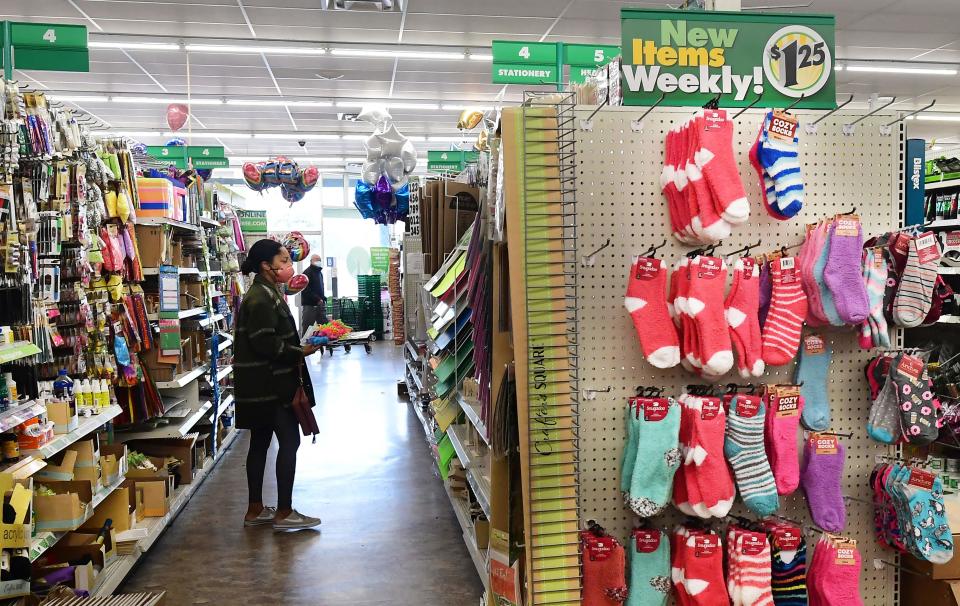Inflation means people are spending less, which may be putting a recession on fast track
Recession is appearing closer on the horizon as consumers show signs of crumbling under the weight of inflation, economists say.
Adjusted for inflation, May consumer spending fell 0.4%, which was worse than economists’ mean forecast for a 0.3% decline. Further, April spending was revised sharply lower to up 0.3% from up 0.7%.
Couple that with the huge downward revision on Wednesday in consumer spending in the first-quarter gross domestic product report to 1.8%, from the reported 3.1% increase, and economists fear a recession is closing in faster than expected.
“Consumer confidence is already fragile while the housing market is making creaking sounds, and with more interest rate hikes to come and the squeeze on spending power from gasoline prices unlikely to be eased anytime soon, the prospects for second-half consumer spending are deteriorating,” James Knightley, ING chief international economist, wrote in a commentary. “There is a very clear threat that the prospect of recession is a late 2022 scenario rather than early 2023.”
Consumers, especially lower-income ones, are increasingly squeezed
A Morning Consult survey on Thursday showed the share of adults who said they had money left over after paying monthly expenses declined to less than 52% in May. That's down 8 points from a year ago and the lowest level since tracking began in September 2020.
And worse, consumers continue to fall further behind as wages haven’t kept up with inflation. Average reported monthly spending grew 6.5% year over year in May, while average earnings growth slowed to 5.2%, the survey said.
“This persistent gap between income and expenses means more adults are falling behind each month,” it said. How fast the shift has been is alarming to some economists.
CHARGE IT: To cope with record inflation, Americans have opened up a record number of credit cards
RISKY DEBT: Inflation's wrath has Americans racking up high debt. What at-risk households need to know
To compensate, consumers are turning to their credit cards. The share of adults who said they typically carry unpaid balances each month climbed 5% in May from a year ago, with especially steep increases among lower-income adults (up 6%) and single parents (up 14%).
Second-quarter grinding to a halt
After the consumer spending data, Knightley expects economists to slash forecasts for second-quarter economic growth. "We now think we will be lucky to get something close to 1%,” he said.
Diane Swonk, Grant Thornton chief economist, is feeling unlucky. She forecasts an economic contraction in the second quarter.
If that happens, that will technically meet the generally accepted definition of a recession as at least two consecutive quarters of negative growth. First-quarter GDP fell 1.6%. However, because the labor market continues to be strong, Swonk isn’t calling this a recession yet.

“We are seeing growth fall due to weak trade and slowdown in consumer spending, but employment is still up 2.44 million for the year,” she said. “That is not a recession, yet.”
INEVITABLE?: Is it too late to prevent a recession? Here's what experts say
PRICE PRESSURE: 'Americans are anxious': Unrelenting inflation puts pressure on Biden ahead of midterms
Many financial market participants, though, are pulling forward their forecasts for when a recession might hit. A Deutsche Bank survey released Thursday with 475 respondents worldwide shows 90% said they expected a recession by the end of 2023, with 20% anticipating one this year. That’s up from 37% and 2% in January, respectively, and 78% and 13% last month.
Medora Lee is a money, markets, and personal finance reporter at USA TODAY. You can reach her at mjlee@usatoday.com and subscribe to our free Daily Money newsletter for personal finance tips and business news every Monday through Friday morning.
This article originally appeared on USA TODAY: Is a recession near? Sharp drop in consumer spending signals it may be

 Yahoo Movies
Yahoo Movies 
